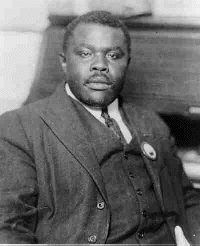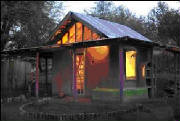|


Letter From
Brother Shaka Barak
President
of the Marcus Garvey Institute
Fellow members of the African race
greetings,
It is a pleasure
to read the words of Africans who are so well read. I enjoy reading the hundreds of articles from my email
written by the well read who do battle on the intellectual battle field. They attempt to give the solutions to the problems
of our African race at home in Africa
and abroad. However, if it was easy to implement these solutions that they propose, they would have been done
a long time ago. Let me also join in this exercise by proposing my prescriptions for what ails the African World. Africans
need leaders who can take their own ideas and make them work for them in the organizing and mobilizing the masses of our people
on a local, national, and international level. Let us build institutions of our own before trying to transport those
ideas abroad or tell some "leaders" hundreds or thousands of miles away what they should or should not do or criticize
them for not being man or woman enough to do this or do that. Where are our new Honorable Marcus Mosiah Garveys?
He was a leader who did more with less between 1914-1920 within his Universal Negro Improvement Association and
African Communities League, than any of us have been able or willing to do in the 21st century. He gave us a blue print, yet
in 66 years since his death, we have not produced one who has acquired the will to build, not only talk, in the interest
of the 1.2 billion African Peoples of the World that even comes close to his achievements of establishing a movement.
To use the idea
of "will power", so often mentioned as lacking among our people, ought to help us realize that the Honorable Marcus Mosiah
Garvey had more will power in the finger nail of his baby finger than most of the intellectuals you can gather at
the United Nations in one day. The Honorable Marcus Mosiah Garvey was the perfect example of the kind of leaders
we talk about, dream of and ought to be trying to imulate. The fact of the matter is that far too often we really dont want
to pay the price of pain, blood and death that the Honorable Marcus Mosiah Garvey paid for us. Our environment, our education,
our research and our passion lacks the stuff that makes heroes, sheroes, martyrs, saints, statesmen, philosophers and scholars
all rolled into one.
We have a character
flaw called leaderlessness that makes us point our fingers at others and not place demands on ourselves so that through
precept and example we can influence other leaders by showing them what we can do. The Honorable Marcus Mosiah Garvey in 1914
asked where is the Black Mans government etc...Then he concluded, "I will help to make them." Where are the scholars
who are saying I will help to make, build, develop and create the things that I see need to be in this new African World? After
66 years we ought to be asking what did the Honorable Marcus Mosiah Garvey do, how did he do it and how do we do
what he did and more? That is the conversation we should have in addition to showing how great we are at researching,
writing, talking and criticizing. If our character flaws will not let us be like or be even greater than the
Honorable Marcus Mosiah Garvey, then we had better start building the Honorable Marcus Mosiah Garvey Centered Schools
to train a generation of future heroes, sheroes, saints, martyrs, statesmen, stateswomen and geniuses. We have far more
to work with today than the Honorable Marcus Mosiah Garvey began with 93 years ago.
Today we know
the price we have to pay if we seek to redeem our race and our Motherland Africa, because every trick in the book was used
against not only the Honorable Marcus Mosiah Garvey but everybody who came after him. We also know how to eat to live,
and reduce our stress so that we dont leave the movement at age 52 like the Honorable Marcus Mosiah Garvey because
our health failed us. My words are to encourage, so what ever you do never stop learning.
Up You Mighty
Race We Can Accomplish and Not Just Talk About, What We Will.


|
| cob cottage |
Sustainable
Development
Natural
Earth & Alternative Building
Techniques:
As Empowerment Tools for Building Communities
During our Ancient History we (Africans) were and understood sustainability.
Our sciences were a part of our culture and not a separate department
from everything day life. They existed within our every day existence.
As we
look at the world’s environment and the impact of modern industrialization it because clear to any thinking person that
there has to be change and our methods of growing food, energy use, etc. etc. must change.
Below,
please find an article by Elder Linda Fletcher who has spent many years working towards a Sustainable Future.
Also,
at the end of the article is an extensive list for group and self study.
Please Click Article - Sustainable Living and Development
FORWARD EVER,
BACKWARDS NEVER!
AFRICA MUST UNITE AND AFRICANS MUST UNITE!
|

